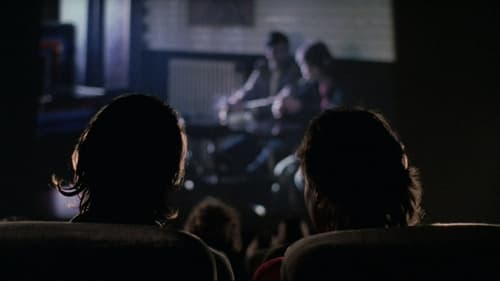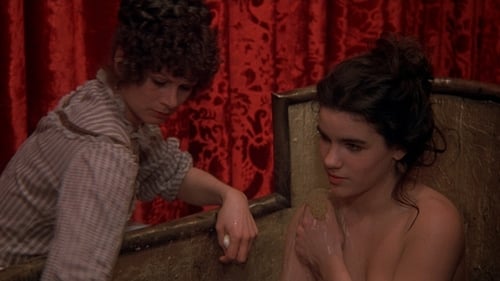
Editor
Châtelaine Marie-Agnès de Bayonnette lives in her family home with her cousin Solange. The lives of the two old ladies are governed by the traditional codes of aristocracy. When Marie-Agnès died, the heirs from Russia had to fight over the estate with a Japanese company that wanted to buy the property.

Editor
Events in an idyllic African village are shown in detail in the period just before logging trucks come in and cut down the forest around the villagers, forcing them to move into the wretched shantytowns that surround major cities throughout the undeveloped world. Despite the familiar premise, this surprisingly unsentimental film by Georgian director Otar Ioselliani has several things going for it, beginning with the cinematography and including the natural and unaffected (non-professional) performances of the villagers.

Editor
A young Russian man arrives in Berlin in search of a woman, but becomes entangled with two others one of whom falls in love with him and another who represents a classic Russian heroine like out of a novel from one of his countrymen idols.

Editor
They meet in Yugoslavia. Katharina, daughter of a Yugoslavian immigrant worker, has grown up in the Federal Republic of Germany. She is a confident, energetic career woman who has managed to work her way up to become a successful television journalist. She goes to visit her parent's country, to do a story about the children of immigrant workers in their home country. Although she says she doesn´t need a "home" any more, even she feels strange in her own country. Peter is a rather "untypical" sort of man: a dreamer, a thinker. He has given up his steady job as a composer for advertising films and is divorced. He goes to Jugoslavia to find something out about the past. He travels to the places where his father was stationed during the Second World War.

Editor
An unusual family story about two father and son generations, beginning on a German country side and ending in the students' revolt in Berlin.

Editor
Emily, a child, stays with her bourgeois grandparents during frequent periods when her mother makes films. Isabelle wraps a picture, flies to her childhood home to pick up Emily, and plans to leave for her place in France. Old wounds between Isabelle and her parents open around Isabelle's life style. It's also apparent that Isabelle's mother, Paula, is unhappy - with her husband and with her youthful hopes dashed when she became pregnant with Isabelle. Unbeknownst to Isabelle, the co-star of the film she's just made has followed her, checked into a nearby hotel, and wants to begin an affair, even though he's married. Can Isabelle sort it out? What's best for Emily?

Editor
The film portrays the 1952 revolution and 1980 coup in Bolivia through the lives of two brothers, Juan José and Martín. Juan José, the legitimate son of Luís, is transformed, by his experiences as a youth in 1950s, to become a boss of one of the groups of paramilitaries during the 1980 coup. Martín, the illegitimate son of Luís and an indigenous peasant, becomes a trade union leader during that period.

Editor
Computer operator Faber works on securing computers for big companies and banks. His private life is rather dull until he meets a strange women, Juliet and falls in love. Her friend convinces Faber to exploit his knowledge to rob a bank.

Editor
In Zola's Paris, an ingenue arrives at a tony bordello: she's Nana, guileless, but quickly learning to use her erotic innocence to get what she wants. She's an actress for a soft-core filmmaker and soon is the most popular courtesan in Paris, parlaying this into a house, bought for her by a wealthy banker. She tosses him and takes up with her neighbor, a count of impeccable rectitude, and with the count's impressionable son. The count is soon fetching sticks like a dog and mortgaging his lands to satisfy her whims.

Editor
Doctors say that Veronika, a woman in her 20s, is schizophrenic. She is compliant, which makes her an easy target for men. She's religious, believing she is God's favorite child; she searches for Jesus. She has sent a letter to a filmmaker suggesting her life as the subject for a movie. We see her raped then take up with a series of men she believes are Jesus, each willing or insistent on sex. A young man with his own crisis of faith invites her to join a cult. We see her involuntarily committed to an asylum from time to time where medication and constraints await. Her wealthy parents are helpless. Will a medical professional ever talk to her? If one did, would it help?

Editor
A man, alone in Berlin. He sleeps and watches TV, walks through the city. A woman approaches him. Does he feel like having coffee with her? No.

Editor
An architect is assigned to modernize a squatted house in the Kreuzberg district of Berlin. But then he meets a young student who is member of a grassroots initiative trying to preserve the quarter. He falls in love with her, although this puts him into conflict with his job. Following his heart, the architect soon changes sides and supports the inhabitants in their struggle against the real estate speculators.

Editor
Wealthy woman and her Ethiopian maid form a friendship.

Editor
Cahiers du cinéma critic Serge Daney asks whether The Kingdom of Naples is "leftist fiction, kitschy melodrama, photo-roman, a decadent chronicle of a city, opera in a minor key, or simply the first realistic narrative film by Schroeter?" It is all of these and more: an epic chronicle of proletarian family life in Naples from 1943 to 1972 that brilliantly captures the wretched poverty, overwrought passions, and political, religious and economic upheavals of Sicily across two generations. Schroeter assimilates neorealist aesthetics and class sympathies with the tempestuous excesses of popular melodrama, borrowing freely from Rossellini, Pasolini, Visconti, Brecht, and Rossini. (Facets)












